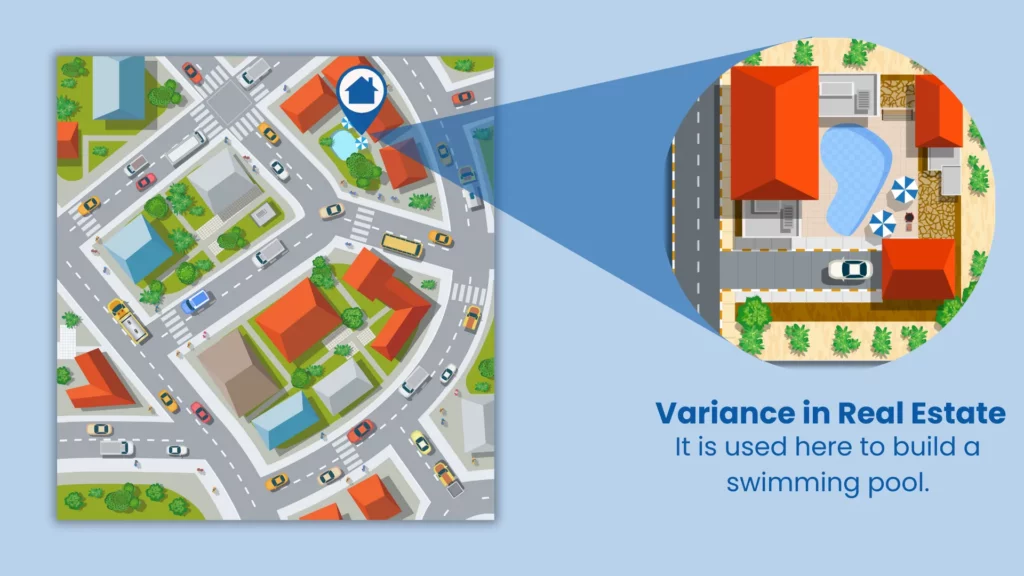Variance is an exception to strict zoning regulations that affect the function of the property. Zoning regulations are implemented to maintain the fair market value of the community and spread equality.
However, it can negatively affect the economy and society as it constrains the number of houses. It leads to an inflated price for the property.
Moreover, variance allows the property owner to make changes for future developments and better function.
⚡3 Key points of Variance in Real estate
- After applying the variance, the zoning body makes the decision, which can be granted or rejected.
- You can reapply for variance; the local court will handle the decision and involve other property owners in the hearing.
- You have to utilize the variance for a specific period. It could expire if not used.
What Is a Variance in Real Estate?
Variance in real estate is contrary to zoning law, or, you can say, a waiver of any zoning regulation. Without changing zoning laws, variance helps the owner get a waiver under special circumstances.
The local zoning body grants the variance after you convince them that the restriction is affecting the function of the property.
After the variance approval, the owner has a specified time within which they have to make changes. But even if they don’t make changes, they will not be penalized.

Variance is used to permit the owner to build the swimming pool. The zoning law has restrictions on making changes to the lawn. However, the property owner obtained permission from the zoning body and was allowed to make changes.
Types of Variance in Real Estate
Here are the two most common variances in real estate:
Area Variance
An area variance helps the homeowner make any physical changes to their property. It is one of the most popular types of variance.
Use Variance
Investors opt to use variance, whereas homeowners opt for area variance. Moreover, the investors make changes to the property that go against zoning requirements with the help of variance.
How To Get a Variance in Real Estate
Here are the steps to get a variance in real estate.
1. Complete the Application
You have to fill out the application, which is available through the local zoning board or authority. In the application, you must describe and prove whether the changes are necessary.
Along with that, you have to ensure the changes don’t harm others’ property. And prove that the current law affects your development plans for your property.
2. Draft a Variance Letter
The property’s owner or real estate attorney must write the variance letter. The process and rules can be complex to understand, for which an attorney can greatly help. They can adhere to local regulations while preparing your letter.
The letter should specify all the changes and the reasons for them. Moreover, the letter should be as clear as possible, which could strongly challenge local regulation.
3. Wait for a Decision
After submitting the letter, you have to wait for approval. The local zoning board can take time to review the letter. They will check the rules and contact your neighbors for more details.
4. Appeal if Rejected
If your variance is rejected, you can appeal for it again. It would go further to the local council, where the local zoning body would inform other owners about the appeal. The property owners can attend the hearing and give their opinions on it.
Their vote affects the final decision, which can come in your favor or be rejected. If the decision doesn’t come in your favor, you can reapply after the given time.
How Much Does a Variance Cost?
The cost of variance depends on the location and the type of variance. Here are a few examples of the variance cost in some regions of the USA:
- Thomasville, NC: The filing fee for applications in Thomasville is $350.
- Madison, WI: For one of two family homes, the variance fee is $50 and $490 for other structures.
- Kent, NY: Unless the variance is for a specific structure, the area variance has a fee of $150.
- Manchester, NH: The variance fees vary according to the specific types, while a $25 non-refundable fee is included.
Does Variance Expire?
The expiration period for the variance is based on local regulations and the type of variance. Most of the variance expires if not utilized within the specified timeframe in the agreement. Some of the variances also have a predetermined time period, after which they expire.
Bottom Line
Being an exception to the zoning law, variance can help you resolve area or structural issues. However, the final decision depends on the local zoning body. In addition, variance in real estate can benefit investors as well as homeowners.
To appeal for a variance, you have to justify your reason in the letter. And a professional real estate attorney can help you with it. Houzeo is home to the best-listed attorneys around the country. You can easily locate them with the nearby map feature.
Find Your New Home With Houzeo
With thousands of property listings, Houzeo.com is one of the biggest property listing sites in the US. Find condos, townhouses, co-ops, and other types of homes for sale on Houzeo.
» Need More Clarity? Read these exclusive Houzeo reviews and learn why the platform is the best in America’s competitive housing market.
Frequently Asked Questions
Can a zoning variance expire?
Yes, Zoning variance can expire. It has a specified time, which is given in local regulations. The time period ranges from 12 months to a few years.
How much does a property variance cost?
The cost of the property variance depends on various factors, like hourly review fees, zoning variances, and local regulations.
Can neighbors stop a variance?
Yes, neighbors can stop a variance. But they can only do that if the variance is in a public appeal process.












.webp)
